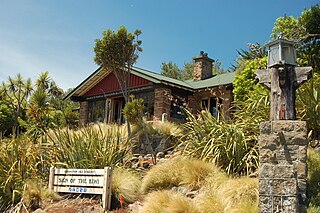
Cashmere is a suburb which rises above the southern end of the city of Christchurch in New Zealand's South Island.
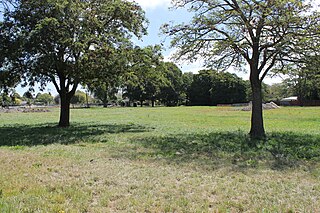
Avonside is an eastern suburb in Christchurch, New Zealand. It is one of the oldest suburbs of the city, with only Heathcote being older.
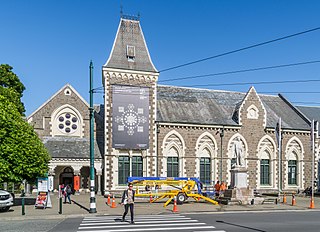
The Canterbury Museum is a museum located in the central city of Christchurch, New Zealand, in the city's Cultural Precinct. The museum was established in 1867 with Julius von Haast – whose collection formed its core – as its first director. The building is registered as a "Historic Place – Category I" by Heritage New Zealand.
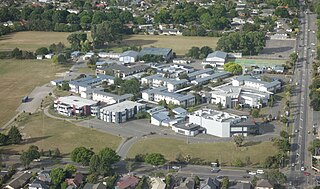
Burnside High School is a state co-educational secondary school located in the suburb of Burnside in Christchurch, New Zealand. With a roll of 2419 students, it is the largest school in New Zealand outside Auckland, and is among the country's four largest schools.

Christchurch Girls' High School in Christchurch, New Zealand, was established in 1877 and is the second oldest girls-only secondary school in the country, after Otago Girls' High School.

William Rolleston was a New Zealand politician, public administrator, educationalist and Canterbury provincial superintendent.

Queen Elizabeth II Park was a multi-use stadium in Christchurch, New Zealand, located in a large park of the same name. The stadium had a capacity of 25,000 people and was built in 1973 to host the 1974 British Commonwealth Games, with a temporary 10,000 seat western stand erected for that event to take the capacity to 35,000. The stadium suffered some damage in the September 2010 Canterbury earthquake but was able to reopen, only to be damaged beyond repair in February 2011 Christchurch earthquake.

St Albans is a large, inner-northern suburb of Christchurch, New Zealand, located directly north of the Christchurch Central Business District. It is the second largest suburb in the city by population, with a population of 13,137 at the 2018 Census. The suburb falls within the Christchurch Central electorate and is represented by Duncan Webb, who has been the member of parliament since the 2017 general election. St Albans is one of the most diverse residential neighbourhoods in Christchurch, with a wide range of densities, architectural styles and housing ages throughout the suburb. It has everything from run-down high-density council-owned flats, to modern luxurious high-density flats and apartments; old mid-density workers cottages through to large low-density estates of various ages.
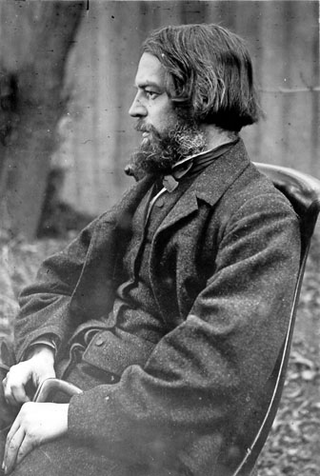
Benjamin Woolfield Mountfort was an English emigrant to New Zealand, where he became one of the country's most prominent 19th-century architects. He was instrumental in shaping the city of Christchurch's unique architectural identity and culture, and was appointed the first official Provincial Architect of the developing province of Canterbury. Heavily influenced by the Anglo-Catholic philosophy behind early Victorian architecture, he is credited with importing the Gothic revival style to New Zealand. His Gothic designs constructed in both wood and stone in the province are considered unique to New Zealand. Today, he is considered the founding architect of the province of Canterbury.
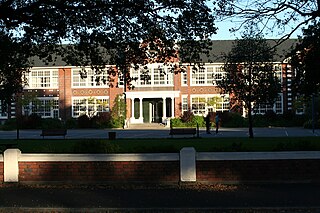
Christchurch West High School existed prior to 1966 on the site of Hagley College in Hagley Avenue, in Christchurch, New Zealand. In that year 'West' amalgamated with Technical High School to become Hagley High School. As part of that amalgamation, the maroon, black and white colours were changed to teal.

Sir Terence Henderson McCombs was a New Zealand politician of the Labour Party, a High Commissioner, and the first principal of Cashmere High School.

Avonside Girls' High School is a large urban high school in Christchurch, New Zealand, with more than 1,000 girls from Year 9 to Year 13. It was formerly in the suburb of Avonside but moved in 2019, along with Shirley Boys' High School, to the former QEII Park site in the east of Christchurch.

Christchurch Central City or Christchurch City Centre is the geographical centre and the heart of Christchurch, New Zealand. It is defined as the area within the Four Avenues and thus includes the densely built up central city, some less dense surrounding areas of residential, educational and industrial usage, and green space including Hagley Park, the Christchurch Botanic Gardens and the Barbadoes Street Cemetery.

Holy Trinity Avonside was a heritage-listed Anglican church located in Linwood, Christchurch, New Zealand. It was registered as a "Historic Place – Category I" by the New Zealand Historic Places Trust. It was "damaged beyond the point of repair" in the February 2011 Christchurch earthquake and was demolished the following September.

Ada Wells was a feminist and social worker in New Zealand.
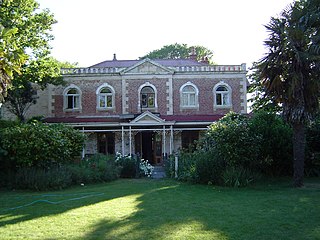
Linwood House was built as the homestead for Joseph Brittan, who, as surgeon, newspaper editor and provincial councillor, was one of the dominant figures in early Christchurch, New Zealand. The suburb of Linwood was named after Brittan's farm and homestead. Brittan's daughter Mary married William Rolleston, and they lived at Linwood House following Joseph Brittan's death. During that time, Rolleston was the 4th Superintendent of the Canterbury Province, and Linwood House served for many important political and public functions.

The Church of St Michael and All Angels is an Anglican church in Christchurch, New Zealand. The church building at 84 Oxford Terrace, Christchurch, is registered as Category I by Heritage New Zealand. Its freestanding belfry is registered separately.

Emily Hill was a New Zealand teacher, temperance worker and suffragist.

Cranmer Court, the former Christchurch Normal School, was one of the most significant heritage buildings in Christchurch, New Zealand. Its demolition, due to some damage in the 2011 Christchurch earthquake, was controversial.

The Canterbury Pioneer Women's Memorial commemorates the pioneer women of Canterbury in New Zealand. After arrival by sea in Lyttelton Harbour, early settlers had to cross the Port Hills via the Bridle Path to reach Christchurch or the Canterbury Plains. The memorial was unveiled at the summit of the Bridle Path in 1940, 90 years after the First Four Ships had arrived in Lyttelton. The impetus for having a memorial was for Christchurch to have a contribution for the New Zealand centennial commemorating the signing of the Treaty of Waitangi in 1840. Hence, the Canterbury Pioneer Women's Memorial commemorates two events that happened ten years apart.





















